Why Do I Crave Sugar? Causes & Tips to Break the Habit
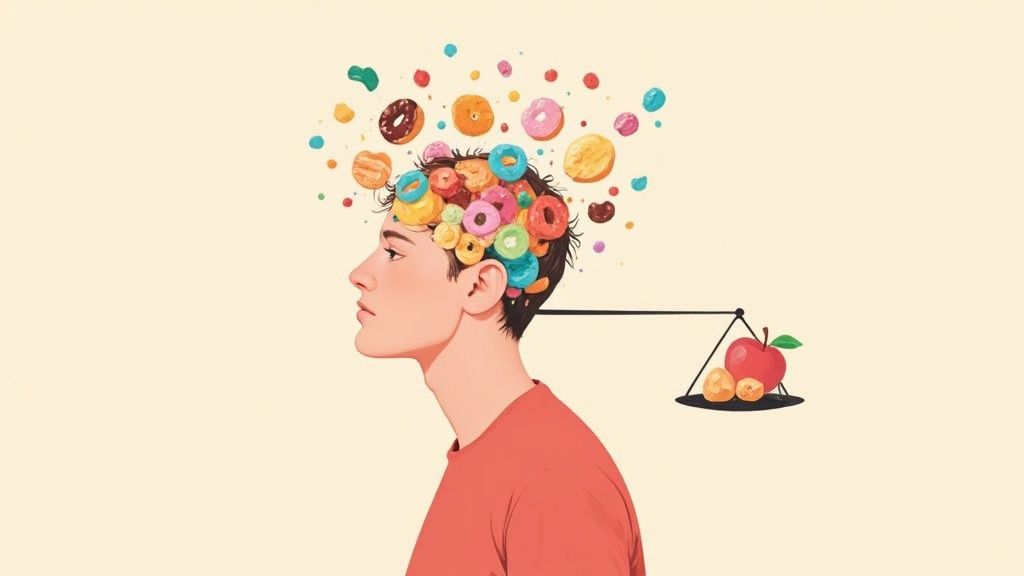
That intense, almost desperate urge for something sweet isn't just a simple matter of willpower. It's actually a potent mix of your biology, psychology, and daily environment all working together. Your brain is hardwired to hunt down the quickest energy source it can find, and in our modern world, that's sugar. This puts our ancient survival instincts in direct conflict with our current reality.
Unpacking the Real Reason You Crave Sugar
Have you ever found yourself wondering, why do I crave sugar so badly? It often strikes in the late afternoon or right after a stressful day. The answer isn't a single culprit, but rather a whole team of factors playing off each other.
Think of your body as a complex machine that's always trying to stay in balance. When just one part gets out of sync—like your blood sugar levels dropping or your emotions running high—it sends out signals. A sugar craving is one of the loudest alarms it can sound.
Our deep-seated desire for sweetness is rooted in pure survival. For our ancestors, finding energy-dense foods like ripe fruit was a matter of life and death. Our brains evolved to reward us for finding these foods by releasing a rush of feel-good chemicals. Fast forward to today, and that same reward system gets lit up by the donut in the breakroom, kicking off a cycle that can feel impossible to escape. This isn't a personal failure; it's ancient biology colliding with a modern food landscape.
The Three Core Drivers
To really get a handle on sugar cravings, it helps to understand the main forces at play. We can break them down into three core drivers that ignite that powerful desire for something sweet.
To give you a clear overview, this table breaks down those primary forces behind your sugar cravings into a quick snapshot.
The Three Core Drivers of Sugar Cravings
| Driver | Simple Explanation | Real-World Example |
|---|---|---|
| Blood Sugar Rollercoaster | When your blood sugar crashes after a spike, your body screams for a quick fix to bring it back up. | That 3 PM slump after a carb-heavy lunch, where you'd do anything for a cookie or soda. |
| Brain Chemistry & Reward | Eating sugar releases dopamine, a feel-good chemical. Your brain remembers this and pushes you to do it again. | Reaching for ice cream after a tough day at work to get that comforting, pleasurable feeling. |
| Gut Health Imbalance | The "bad" bacteria in your gut thrive on sugar and can actually send signals to your brain demanding more of it. | Constantly craving sugary snacks, which could be a sign that your gut microbiome is out of balance. |
Seeing these drivers laid out makes it easier to see how interconnected they are. A blood sugar crash can trigger a reward-seeking behavior, which then feeds the unhealthy gut bacteria, creating a powerful loop.
This infographic helps visualize how these biological triggers work together.
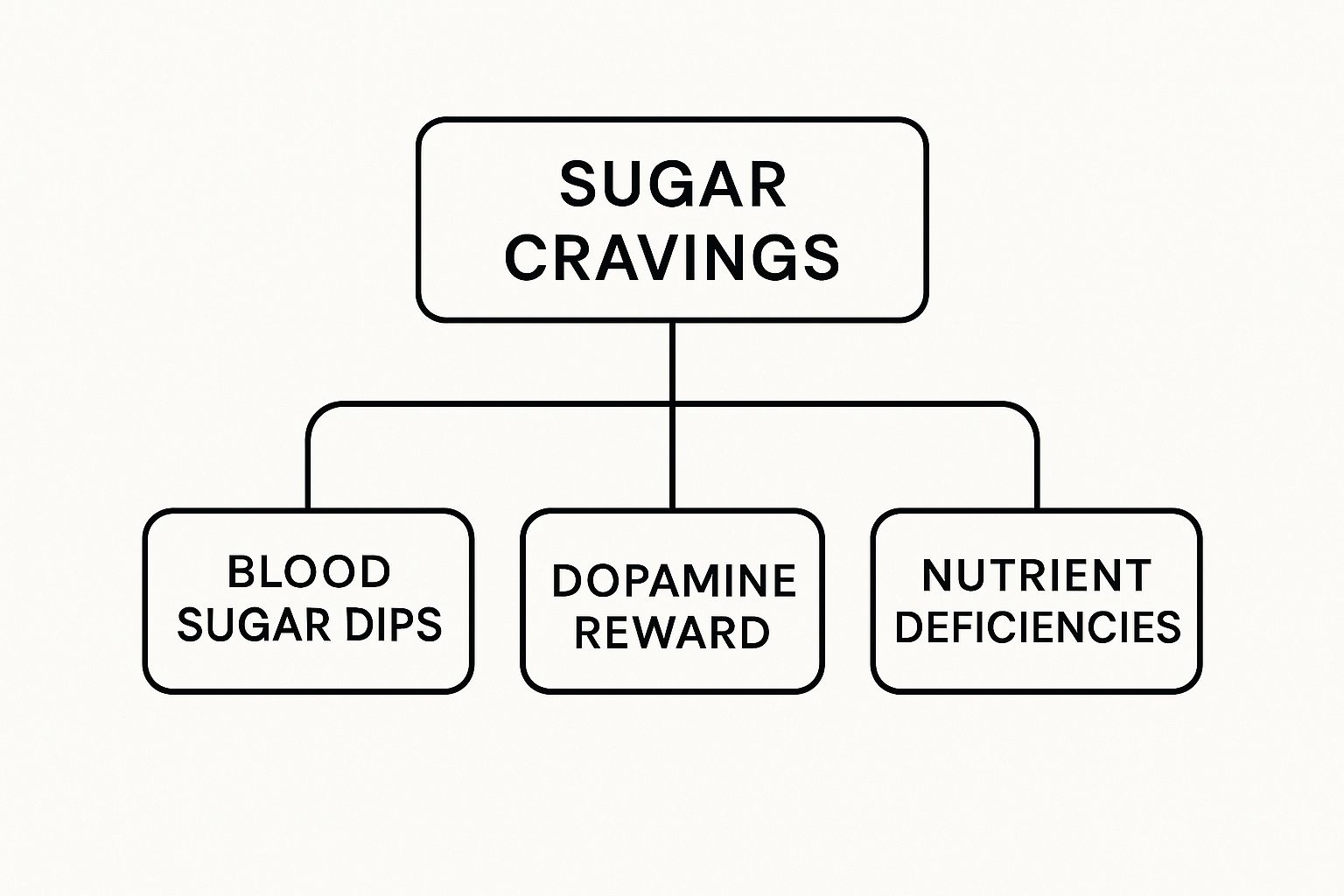
As you can see, that overwhelming urge for sugar often kicks off with unstable blood sugar, the brain's hunt for a reward, or even gaps in your nutrition. Grasping how these pieces fit together is the first real step toward getting them under control.
This initial period of cutting back can be tough, so it’s wise to prepare yourself by understanding sugar withdrawal symptoms as your body begins to adjust.
The cycle often begins when high levels of insulin lead to low blood sugar, which in turn triggers intense cravings. This creates a feedback loop where indulging in sugar can temporarily fix the problem but ultimately worsen insulin resistance over time.
How Your Brain Responds to Sugar
Ever wondered why that late-night ice cream craving feels so incredibly powerful? It’s not just a lack of willpower. To really get why we crave sugar, we have to take a look inside our own heads.
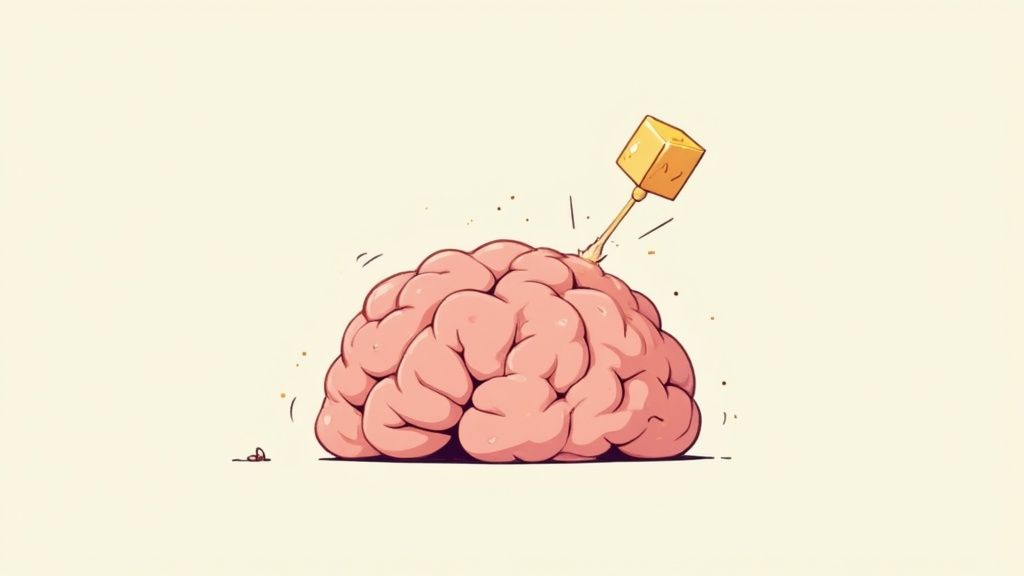
When you eat something sweet, it’s like a switch flips in your brain's reward system. This triggers a rush of a feel-good chemical called dopamine. This isn't just a minor mood boost; it's a powerful signal that essentially tells your brain, "Hey, that was amazing! Let's do that again."
This creates a potent feedback loop. Every time you give in to a sugar craving, you're strengthening that connection. Your brain quickly learns to associate sugar with pleasure, which is why the urge feels even more intense the next time you're stressed, tired, or just walk past a bakery.
The Dopamine Rush and Reward Cycle
Think of your brain's reward system as its built-in survival software. It's programmed to help you remember and repeat actions that are good for you, like eating high-energy foods. When our ancestors stumbled upon a rare source of sweetness like fruit, that dopamine hit was a crucial signal: "This is a great source of fuel. Remember it!"
The problem is, our ancient wiring hasn't caught up to our modern world. Today, sugar is everywhere. That same reward system that once helped us survive can now work against us, training our brains to hunt for sugar not just for energy, but for the instant comfort and pleasure it brings.
This isn't just a modern habit; it's an instinct baked into our biology. For millennia, humans sought out sweetness for quick, life-sustaining energy. Today, that instinct is supercharged by constant access. Global sugar consumption hit about 177.33 million metric tons in 2023/24. If you're curious, you can explore the full consumption data and see just how big this trend has become.
The more you repeat the cycle, the more your brain adapts. It starts to anticipate that dopamine reward, which is a big reason you find yourself reaching for a cookie when you feel down or need a quick pick-me-up. The memory of that sweet relief becomes a very persuasive motivator.
The Blood Sugar Rollercoaster Effect
Beyond the brain chemistry, there's another biological process making things tricky: the blood sugar rollercoaster. When you eat something sugary, particularly on an empty stomach, your blood sugar spikes. In response, your body releases a flood of insulin to quickly shuttle all that sugar out of your bloodstream and into your cells for energy.
But this rapid response is often too effective. It causes your blood sugar to plummet just as fast as it rose, leading to the dreaded "sugar crash." This crash can leave you feeling:
- Tired and sluggish
- Irritable and cranky
- Mentally foggy and unable to focus
And when that crash hits, what does your brain demand? You guessed it—more sugar. It wants the quickest possible fix to bring its energy levels back up. This kicks off a vicious cycle where the very thing you used to solve your afternoon slump ends up causing the next one.
Your Gut’s Surprising Role
It turns out your brain isn't the only one calling the shots. Your gut, often called the "second brain," plays a huge role in your cravings. The trillions of bacteria that live in your digestive system—your gut microbiome—can actually influence what you want to eat.
Some of the "bad" bacteria in your gut absolutely love sugar. When you eat it, they thrive, multiply, and can send signals up to your brain asking for more of their favorite food. If your gut microbiome is out of balance, it can directly fuel those intense, hard-to-resist sugar cravings, creating another feedback loop that can be tough to break.
The Hidden Psychology of Your Sweet Tooth
Beyond the complex biology of dopamine and blood sugar, there's another powerful force driving your sweet tooth—your own mind. If you’ve ever wondered, "why do I crave sugar so much?" the answer often lies in the deep-seated connections we build between sweetness and emotion throughout our lives.
These cravings aren't just physical; they're profoundly psychological.
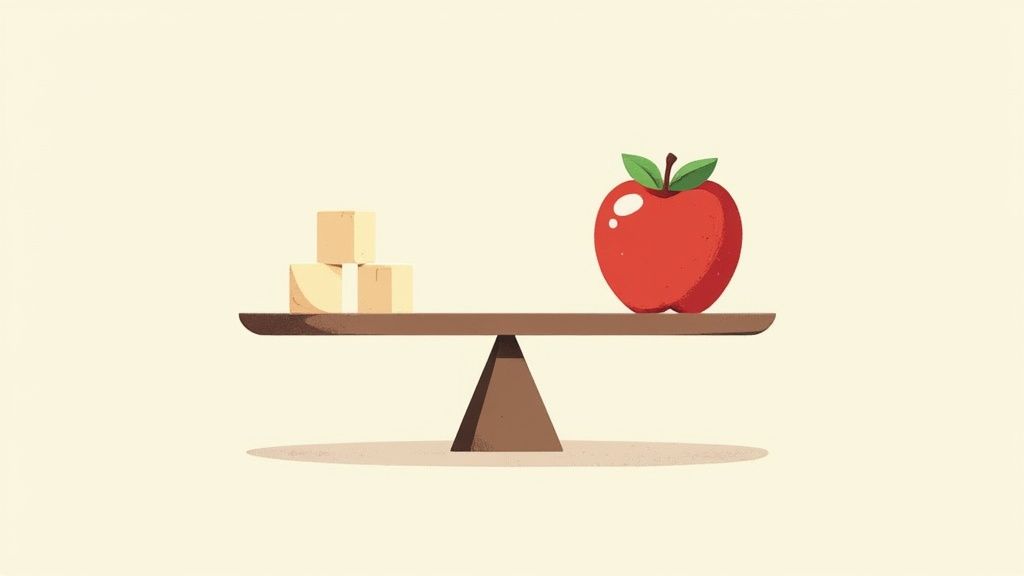
Think about it. From a very young age, we learn to connect sugar with positive experiences. Birthday cakes mark celebrations. Ice cream soothes a scraped knee. A cookie is a reward for good behavior. This process, known as conditioning, trains our brain to see sugar as much more than food. It becomes a reliable source of comfort, joy, and relief.
This learned association is incredibly strong. Over time, that sweet treat becomes a dependable shortcut to feeling better, creating a habit that can stick with us for a lifetime.
Emotional Eating and Your Go-To Comfort Food
When feelings like stress, sadness, or even plain old boredom take over, your brain instinctively searches for familiar ways to cope. Thanks to years of conditioning, sugar is often at the top of that list. This is the very heart of emotional eating.
Reaching for a pint of ice cream after a rough day isn't a random choice. It's your brain’s subconscious attempt to self-soothe. It remembers the pleasant rush that comes with that sweet, creamy texture, and it nudges you toward it to escape the negative feeling you're in. It's a quick, easy, and predictable source of comfort.
Cravings can be powerful signals from your body and mind. They can be triggered by emotional, environmental, or physical factors. When these cravings lead to behaviors like binge eating, it's often linked to a need for healthier coping strategies to manage difficult emotions with self-compassion.
Understanding this link is the first real step toward breaking the cycle. The craving isn't always for the sugar itself, but for the feeling of relief and comfort you've learned to connect with it.
Identifying Your Personal Triggers
To get a handle on your cravings, you need to become a bit of a detective of your own habits. The key is to figure out the specific emotions or situations that send you hunting for a sugary fix.
Your personal triggers might include:
- Stress: A tight deadline at work or a family argument might have you reaching for a candy bar for a quick energy boost and mental escape.
- Boredom: An empty afternoon with nothing scheduled can easily lead to mindless snacking on cookies just to fill the void.
- Sadness: Feeling down or lonely can make the nostalgic comfort of a warm brownie feel like a temporary hug.
- Reward: After finishing a tough workout or a big project, you might feel you've "earned" a rich dessert as a way to congratulate yourself.
Once you start recognizing these patterns, you can shift your focus from simply fighting the craving to addressing the real emotion behind it. The next time you feel that intense urge for something sweet, just pause and ask yourself, "What am I really feeling right now?" This simple question is incredibly empowering. It opens the door to finding healthier ways to cope that don't involve the sugar rollercoaster.
How Your Environment Shapes Your Cravings
While your biology and brain chemistry are major players, they don't operate in a vacuum. Your surroundings—the world you walk through every day—are the stage where your sugar cravings play out. It's easy to blame a lack of willpower, but the truth is, our environment often works against us, making the fight against sugar feel like an uphill battle.
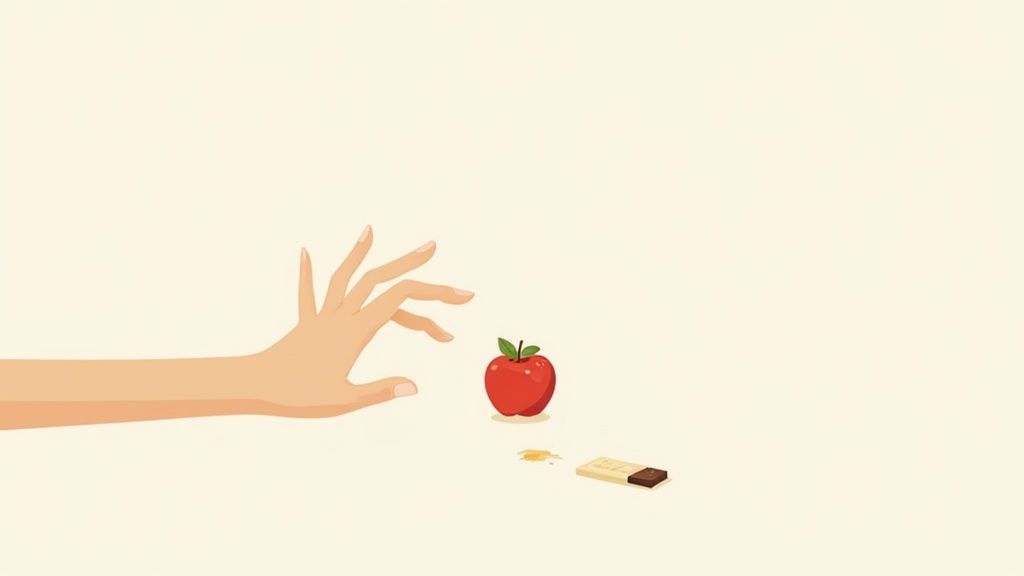
From the moment you step into a supermarket to the ads that seem to follow you across the internet, you're swimming in a sea of sugary temptations. This is no accident. Our modern food landscape is meticulously engineered to push you toward sweet, convenient, and highly profitable products. When you're constantly navigating a world saturated with sugar, resisting it becomes a monumental task.
The Marketing Machine
Food companies are masters at making sugar seem irresistible. They pour billions of dollars into advertising that masterfully links their products to our deepest desires for happiness, comfort, and celebration. Just think about it: commercials overflowing with happy families sharing sugary cereal or friends bonding over a bottle of soda.
This relentless marketing builds powerful, subconscious connections in our minds. Over time, we start associating these products with positive feelings, making them the first thing we reach for when we need a little pick-me-up. The industry isn't just selling food; it's selling an emotional experience, with sugar as the star ingredient.
This is a huge reason why you crave sugar when you simply see a logo or think about a specific brand. The marketers have already laid the groundwork in your brain.
The challenge isn't just in your head or on your plate—it's woven into the very fabric of our global economy. Our modern world is structured around the production and sale of sugar, making it a constant presence in our lives.
The sheer size of this industry explains why these cravings are so common. The sugar market was valued at a staggering USD 70.35 billion in 2024 and is projected to more than double to USD 142.1 billion by 2035. This growth is driven by its widespread use in the exact things we're marketed most heavily: soft drinks, candy, and baked goods. You can dive deeper into the numbers on the global sugar market on MetatechInsights.com.
Designed for Consumption
It's not just the ads. Your physical environment is also set up to encourage you to eat more sugar. Experts sometimes call this an "obesogenic environment," a fancy term for a setting where the unhealthy choice is almost always the easiest one.
Think about these common environmental traps we all encounter:
- Grocery Store Layout: Where are the sweets and sugary drinks? Always at eye level, on the end caps of aisles, and right at the checkout. This prime real estate is meant to trigger impulse buys when you're tired and your defenses are down.
- Convenience and Availability: There’s a vending machine in the office, a candy bowl on the reception desk, and a fast-food joint on every corner. A quick sugar hit is never more than a few steps away.
- Social Norms: So much of our social life revolves around sugar. Think office birthday cakes, holiday sweets, or the dessert menu that automatically comes after dinner with friends. Saying "no thanks" can feel awkward, even antisocial.
All these environmental cues work in tandem to make high sugar intake feel completely normal. Understanding this system is a game-changer. It helps shift the focus from personal blame to recognizing a shared challenge. You aren't weak for craving sugar; you're having a perfectly normal response to an environment designed to make you crave it. Seeing these external pressures for what they are is the first step toward consciously navigating them.
Practical Ways to Manage Sugar Cravings
Alright, now that you understand the "why" behind your sugar cravings, let's get into the "how." How do you actually get a handle on them? This isn't about willpower or fighting your body. It's about working with it to build smart, sustainable habits that quiet those intense urges for good.
The first, and most important, job is to get your blood sugar on an even keel. When your blood sugar plummets, your brain panics and sends out an S.O.S. for the quickest energy fix it can find—which is almost always sugar. By preventing that wild ride, you can stop the cravings before they even start.
Balance Your Blood Sugar with Protein and Fiber
Think of protein and fiber as the steadying hands on the blood sugar rollercoaster. They slow everything down, preventing the rapid absorption of sugar that leads to a huge spike and the inevitable crash. The result? You feel full longer and have a steady stream of energy, not a frantic surge.
Here are a few simple ways to weave them into your day:
- Rethink Breakfast: Swap out that sugary cereal for something like Greek yogurt topped with berries and nuts. Or try a couple of eggs with a side of avocado.
- Snack Smarter: When that 3 p.m. slump hits, reach for an apple with peanut butter, a handful of almonds, or some hummus with carrot sticks instead of the candy bar.
- Bulk Up Your Meals: Toss some beans or lentils into your salads and soups. Make sure lunch and dinner always include a solid protein source like chicken, fish, or tofu.
These small tweaks tell your body it has a reliable fuel source on board, so it doesn't feel the need to send out those desperate alerts for a quick sugar hit. For a deeper dive, check out our guide on how to reduce sugar cravings with smart food choices.
"The key is to prevent the dips in blood sugar that trigger intense cravings. Eating small, balanced meals regularly throughout the day keeps your energy stable, making it easier to resist the urge for a quick sugar hit."
This strategy is more important than ever when you look at the world around us. Global sugar production is expected to hit a staggering 187.2 million tons in the 2025/26 season, according to data from Czapp.com. All that sugar makes cheap, sweet products incredibly easy to find, which is why having a proactive plan is your best defense.
Hydration and Sleep Are Your Secret Weapons
It’s surprisingly common for our bodies to mix up their signals. Sometimes, what feels like a desperate need for a cookie is actually just your body telling you it's thirsty. Next time a craving strikes, try drinking a big glass of water and waiting 15 minutes. You might find the urge just fades away.
Sleep is the other big one. Skimping on sleep throws your hunger hormones completely out of whack. It cranks up ghrelin (the "go eat!" hormone) and dials down leptin (the "I'm full" hormone). If you’ve ever wondered, "Why do I crave sugar so much when I'm tired?"—that hormonal mess is your answer.
Just aiming for 7-9 hours of quality sleep a night can work wonders. It helps reset your appetite and gives you the mental energy to make better choices when you're awake.
Common Questions About Sugar Cravings
As you dig into the "why" behind your sugar cravings, you're bound to have some questions. It’s totally normal. Getting straight answers is a huge part of feeling confident and in control as you move forward. Let's tackle a few of the most common ones I hear all the time.
Can I Ever Truly Stop Craving Sugar?
This is the big one, isn't it? The honest answer is that it's more about management than complete elimination. We’re hardwired from birth to prefer sweet tastes, so thinking you’ll never want a sweet treat again is probably setting yourself up for disappointment. That's not the goal.
Instead, the real win is massively reducing the intensity and frequency of those cravings. When you start eating balanced meals, get a handle on your stress, and prioritize good sleep, you're essentially retraining your body and brain. Before you know it, those all-consuming urges become quiet little thoughts you can easily dismiss.
The goal isn't to fight a constant battle. It's to build a lifestyle where cravings just don't have the same power over you anymore. You’re in the driver's seat, not the craving.
Are Artificial Sweeteners a Good Alternative?
This is a tricky one, and there’s no simple yes or no. On the one hand, sweeteners like stevia or aspartame won't spike your blood sugar and don't have calories. For some people, they can be a helpful crutch to get off the real stuff, especially at the beginning.
The catch? Research shows they still light up the sweet-taste receptors in your brain. This can keep your taste buds accustomed to hyper-sweet flavors, which makes it tough to appreciate the subtle, natural sweetness of something like a piece of fruit. You might be swapping the source of the sweetness without actually breaking the psychological habit. A better long-term strategy is usually to dial down your need for intense sweetness altogether.
How Long Until Sugar Cravings Go Away?
There's no one-size-fits-all answer here. Everyone's timeline is different because it depends on your unique biology, how long you've been eating a lot of sugar, and how deeply it's tied to your emotions. But, there are some pretty common patterns most people experience.
You’ll likely notice a real difference within just a few days as your blood sugar starts to level out. That first week can feel like the toughest climb, but it gets better from there if you stick with it.
- Days 1-3: This is often peak intensity for cravings as your body cries out for what it’s used to.
- Week 1: You'll probably notice your energy is more stable, and that "hangry" feeling starts to fade.
- Weeks 2-4: This is where the magic happens. New habits feel more automatic, and the cravings become much weaker and pop up way less often.
If sugar has been your go-to for comfort or stress relief, it might take a bit longer to build new coping skills. Just be patient with yourself. Every day gets a little easier as your body and brain adapt. If you need some extra support, there are tons of great tips on how to stop sugar cravings naturally that can help you on your journey.